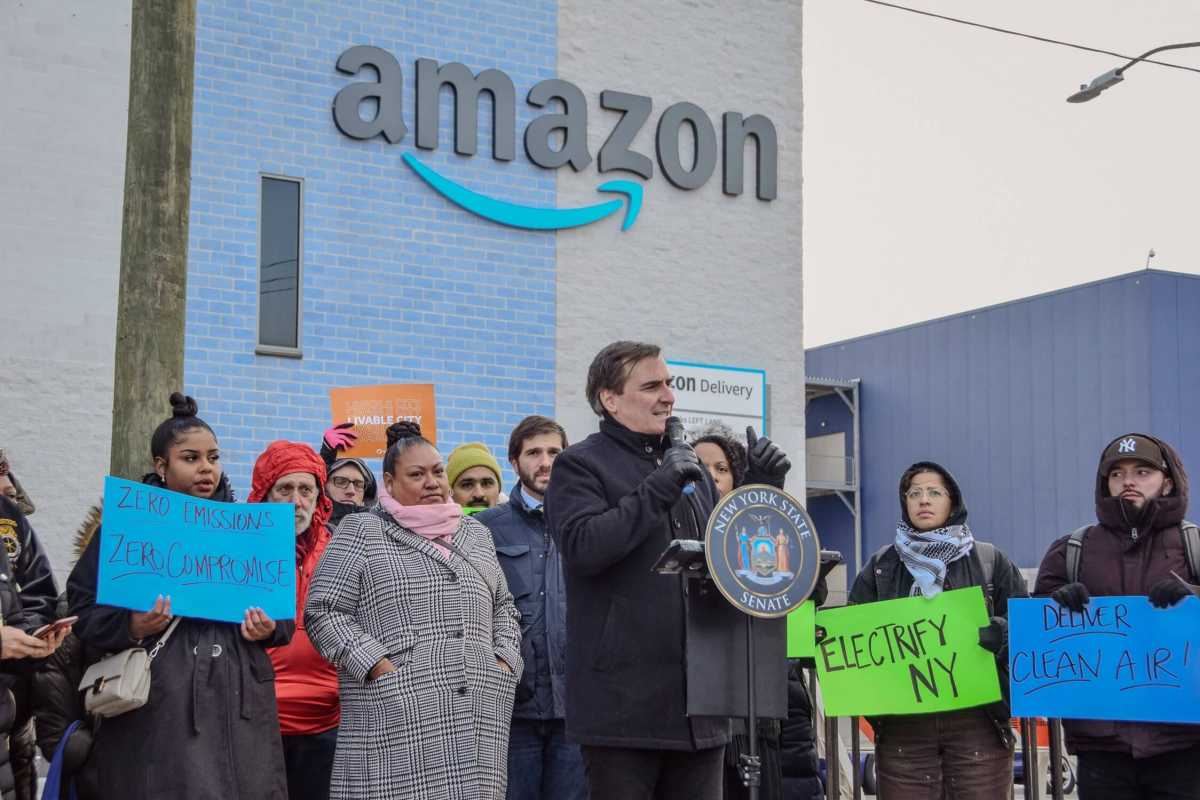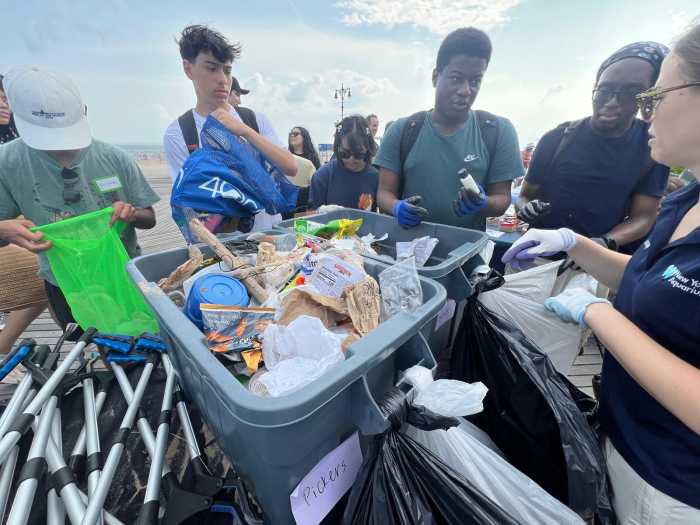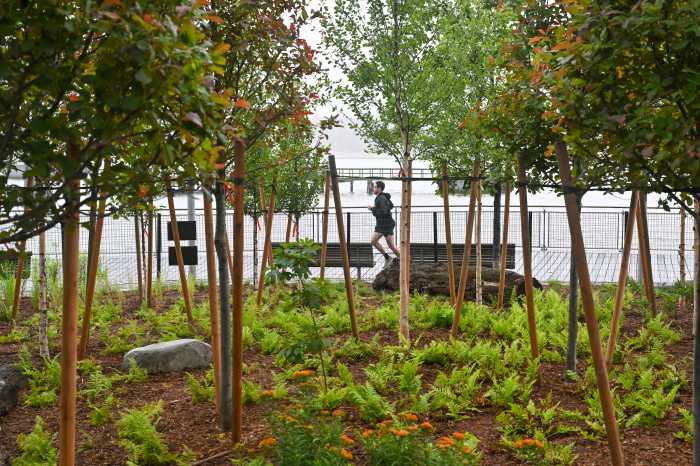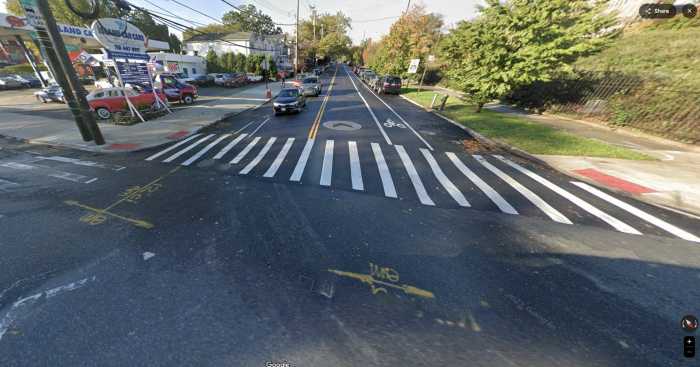New York State and city elected officials joined forces on Tuesday to support a new bill which aims to reduce greenhouse gas emissions associated with the boom of e-commerce warehouses in New York, and the massive amounts of trucks needed to transport goods from those warehouses.
The bill, called the Clean Deliveries Act, seeks to establish an indirect source review — a kind of environmental review — for some warehouses. The source review would introduce regulations on emissions produced by those warehouses and the trucks that service them, and could also force them to adopt measures that would decrease air pollution.
E-commerce warehouses like those used by Amazon are much larger than traditional warehouses — some spanning upwards of one million square feet — and operate largely on a 24-hour basis during the “last-mile” delivery process, which describes the arduous process of transporting packages from their hubs or warehouses to their final destinations.
Since these warehouses are substantially larger and more abundant than ever, thanks in part to the COVID-19 pandemic, advocates say the amount of pollution and emissions they produce is becoming increasingly harmful to the communities they are in.
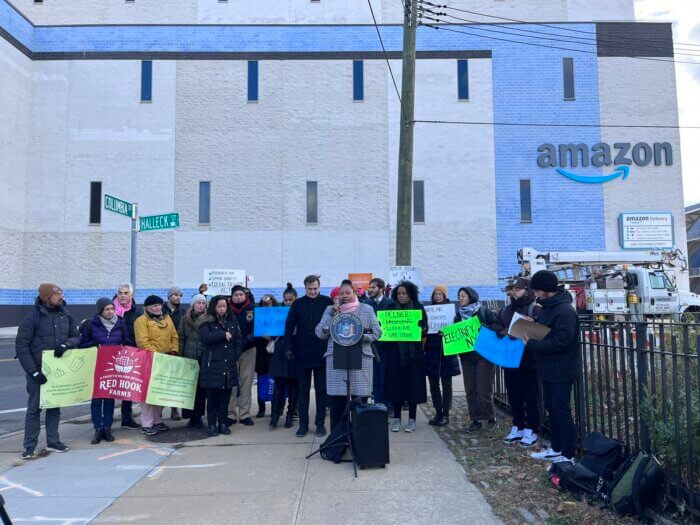
In Red Hook, the environmental damage caused by the expansion of e-commerce warehouses is hitting the predominantly Black and brown neighborhood particularly hard. According to a study by Consumer Report conducted in partnership with the Red Hook community, a traffic sensor on one of the neighborhood’s main streets counted nearly 1,000 heavy duty trucks and vans operating on an average work day in the area.
These vehicles, which are largely diesel-operated, emit large volumes of particulate pollutants like nitrogen oxides and volatile organic compounds which are proven to cause negative health effects and worsen air quality.
Air quality monitoring of the Red Hook Houses, Brooklyn’s largest public housing complex, found that levels of particulate pollution were found to be harmful to sensitive groups — and asthma levels in the area are already disproportionately high.
“Sunset Park and Red Hook, like many working-class communities of color across the State of New York, have been the sites of increasingly large last-mile warehouse facilities that send trucks out throughout our neighborhoods every day,” said Assembly Member Marcela Mitaynes, one of the bill’s co-sponsors. “Our communities experience real worsening effects from these facilities in the form of pollution, posing health risks, safety, as a result of traffic violence, and natural disasters, as we face a future of climate catastrophe. And yet, these effects are not recognized because either the trucking emissions are not sufficiently monitored or because regulations to oversee these facilities have not been effectively implemented.”
The Red Hook community has been incredibly involved in the push to enforce more environmental regulations on e-commerce warehouses in the area, with Community Board 6 organizing several meetings and encouraging research and discussion about how to protect its residents.
In a Sept. 27 letter to Mayor Eric Adams, the Red Hook Business Alliance expressed “deep concern” about the expansion of last-mile facilities like e-commerce warehouses in the area and with the heavy volume of commercial traffic.
“These vehicle trips are major contributors to poor air quality and traffic congestion in Red Hook, a neighborhood with one of the city’s highest concentrations of NYCHA residents and narrow (and in some cases, historic cobblestone) streets,” the letter reads. “We have also lost historic buildings due to last-mile development, and that has impacted the sense of place of Red Hook. It is both unconscionable and illegal that our community – designated as an Environmental Justice Area and Potential Area – should bear the environmental, economic, architectural, safety, and quality of life costs of other Brooklynites’ predilection for quick home delivery of online purchases the only profit large corporations with no ties to our economy.”
Speaking in support of the bill on Tuesday, lawmakers, environmental advocates and members of the ElectrifyNY Coalition emphasized the changes they hoped the new bill would make — chief among them establishing reviews of emissions of all e-commerce warehouses exceeding 50,000 square feet, creating a plan for reducing and mitigating air emissions, and implementing zero-emission vehicles and charging infrastructure.
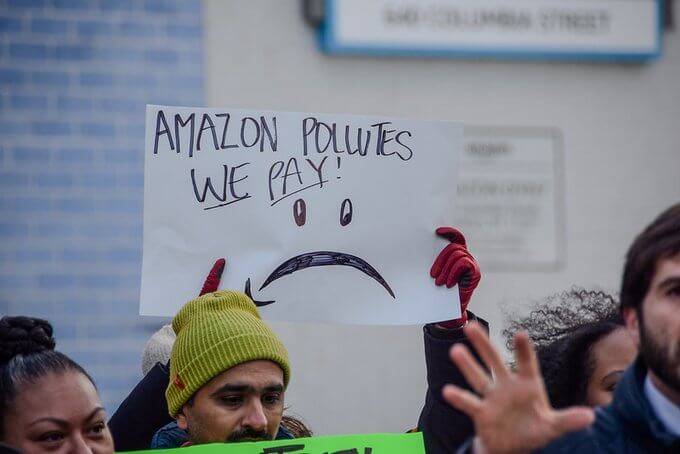
“The unchecked growth of large warehouses in neighborhoods across NYC has worsened air quality, noise pollution, and traffic safety for everyday New Yorkers,” said state Sen. Kristen Gonzalez. “The Clean Deliveries Act is a crucial step towards holding warehouse operators accountable for their emissions and ensuring the well-being of our communities. We must prioritize the health and safety of our residents by passing this important legislation in 2024.”
Other leaders applauded the new legislation and emphasized the urgency of its implementation.
“As we enter the heart of the holiday shopping season, it’s imperative to recognize the impact of our growing e-commerce footprint,” said Renae Reynolds, Executive Director of Tri-State Transportation Campaign. “The Clean Deliveries Act represents a crucial step towards sustainable urban growth and environmental justice. By regulating emissions from mega-warehouses and promoting zero-emission vehicles, we’re not just advocating for cleaner air; we’re fighting for the health and safety of our communities, especially those disproportionately affected by pollution.”


